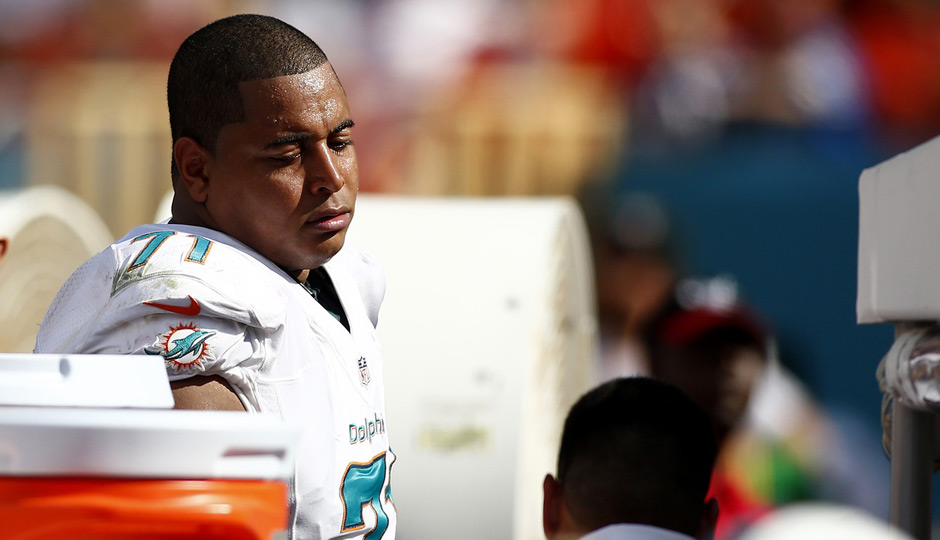How Do You Bully a 300-Pound NFL Lineman Like Jonathan Martin?

Miami Dolphins tackle Jonathan Martin (71) on the sideline in the second half of a game against the Buffalo Bills at Sun Life Stadium. | Robert Mayer-USA TODAY Sports
To anyone whose kid has ever suited up for competitive sports, the news out of Miami last week was incomprehensible. Dolphins left tackle Jonathan Martin, a 6-foot, 5-inch, 320-pound mountain of a man, took offense at a locker-room prank—reportedly, his teammates wouldn’t let him sit with them at lunch—threw down his tray of food, and walked away. He went AWOL, and was scrubbed from Thursday night’s overtime sneak-win over the Bengals. Up till then, he had started all 21 games of his NFL career.
News reports said Martin had been the victim of bullying by his teammates, who nicknamed him “Big Weirdo.” That’s the kind of teasing that stings. But still. Martin made $390,000 in his rookie season last year. Wouldn’t that be enough to make you laugh along with any nickname at all?
Apparently it wasn’t for the Stanford-educated Martin. He’s now reportedly seeking “mental counseling.” And that made me feel, frankly, a little shitty about how Philly Mag sneered at former Sixer Royce White when the team let him go last week. A writer labeled him an “enigmatic philosopher-king with an anxiety disorder.” It’s true that White refuses to fly, and has asked that teams accommodate his special needs by, among other things, arranging alternate transportation for road trips. Talk about Big Weirdos. Are your hackles rising? Does that seem like coddling? A six-foot-eight former NCAA Men’s Basketball honorable mention All American afraid to get on a plane?
Here’s the thing, though: We’ve all got demons. I share Royce’s—I’m afraid to fly, too. It doesn’t affect my employment much, though I do miss out on some cool press trips to far-off climes. But if I were 22 years old and embarking on an NBA career, I have to believe I’d fly wherever the team wanted me to.
His malady may appear almost silly. Yet White has been a vocal spokesman for the rights of the mentally ill, an advocate for those in sports who suffer from ailments like his own. If he seems like an anomaly, consider former Eagles lineman Shawn Andrews, who saw his career dissolve due to depression, or former Raiders linebacker Rolando McClain, who walked away from his NFL career because he feared he’d “lose it” like Jovan Belcher or Aaron Hernandez. He was 23 years old. McClain was making $700,000. He told ESPN’s Seth Wickersham, who just wrote a lengthy profile, he was consumed by anger; he felt “like I just wanted to kill somebody.”
It’s hard, when you don’t have much money, not to imagine that having plenty would solve all your problems—would make the fear of flying go away, or the wounded feelings, or the anger that roars in your head. But it doesn’t, and the fact that men like Royce and McClain and Andrews have been willing to talk publicly about their struggles is admirable—and amazing, when you think about it.
In an interview with the New York Times in 2009, Andrews spoke movingly about being picked on when he was a kid because he was so big—he weighed 230 pounds by the time he was 12—and poor. McClain told Wickersham he grew up surrounded by drugs, guns and violence; his mom once threatened him with a knife, and he took out a restraining order against her. His mom. Martin’s parents are both attorneys, and his home life was stable. But he did go to Stanford, and you know how relentless jocks can be to the “smart kid” in the room.
Yes, there’s a lot of hypersensitivity in our world today; no one gets more worked up about that than I do. There’s too much arguing over who can say the “n” word and who can’t. Parents try too hard to finagle special privileges for their kids, with dubious diagnoses of learning disabilities and ADHD. Sometimes it seems like we all want to be accommodated all the time. And we can’t. Somebody has to do the accommodating, after all. (FYI, as my favorite headline of the year recently put it, BULLYING IS NOT ON THE RISE AND IT DOES NOT LEAD TO SUICIDE. But mental illness does.)
Still, there’s a lot to be said for athletes being seen as folks with problems just like everybody else. The less perfect they’re willing to appear—and the lower the pedestals on which we put them—the smaller the divide between us and them. In theory, that should lead to a society in which being an athlete doesn’t give you license to rape women or not bother with college classes or go on drunken rampages. And it should also keep athletes in general from being viewed—and persecuted in turn—as violent or self-destructive or irresponsible or, well, weird because some of them suffer from diseases that we still aren’t willing to acknowledge are real. (NFL players are actually less likely than other adult men to be arrested for DUI, drugs, or assault and battery.) That’s the kind of level playing field everyone ought to be able to get behind.


